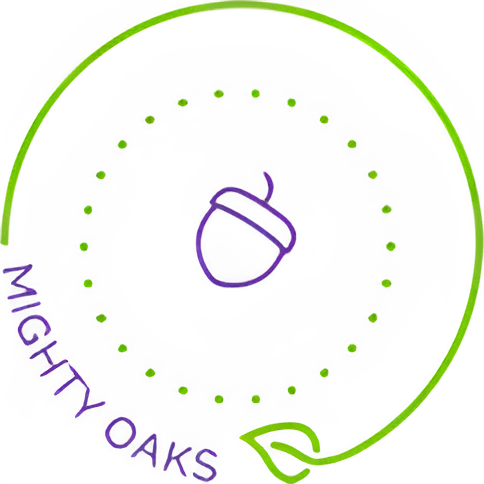Serving Cypress Families
Mighty Oaks Therapies is a second clinic location for Unique Therapy. Unique Therapy’s speech-language pathologist, Ms. Abby, is on-site at Mighty Oaks in Cypress on Tuesday and Thursdays. You can find out more about Ms. Abby on our “About Us” page or you can click here to go to the Unique Therapy website to schedule for services at the Cypress clinic location with Ms. Abby:
unique therapy
What types of pediatric therapy services are provided by a licensed Speech-Language Pathologist (SLP)?
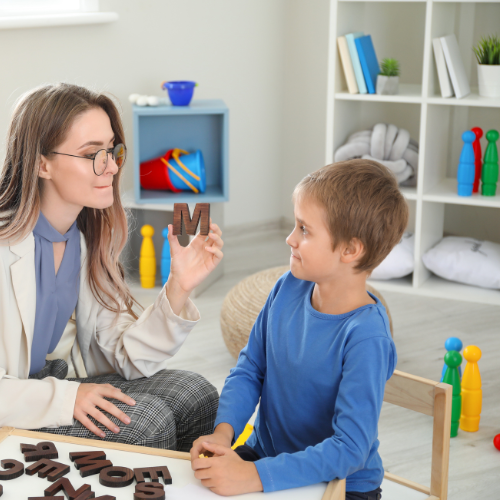
Understanding Language Development
Receptive language includes what a child comprehends (what’s coming IN to the brain). This may be demonstrated through pointing and identifying language concepts, following directions and/or commands, and comprehension of spoken or written language. Expressive language includes how a child communicates including verbalizing, signing, gesturing. babbling, jargon, using AAC (Augmentative and Alternative Communication) devices, or a mixture of these, aka total communication. Pragmatic language (social language) includes various types of play (functional play, symbolic play, solitary play, onlooker play, parallel play, pretend play), joint attention, greeting others, and engaging others in conversations appropriately.
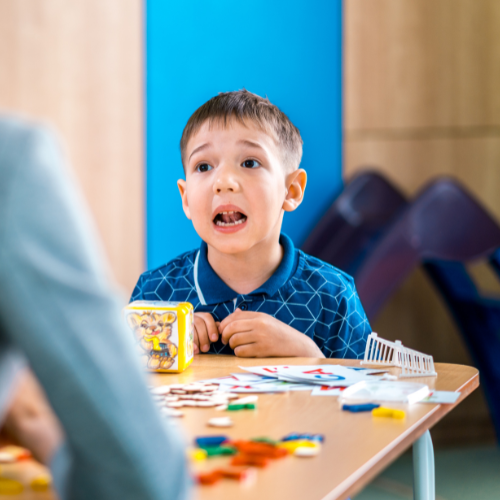
Recognizing Stuttering vs. Normal Disfluencies
Normal disfluencies can occur when a child or even an adult is searching for the correct word or idea and instead of fluency speech there may be a pause, stopping, or an inserted “um”. However, stuttering includes repeating part of a word or whole words, prolonging sounds, excessive insertions of uh’s or um’s, and blocks (long pauses where the child wants to speak a word or words but is unable to.
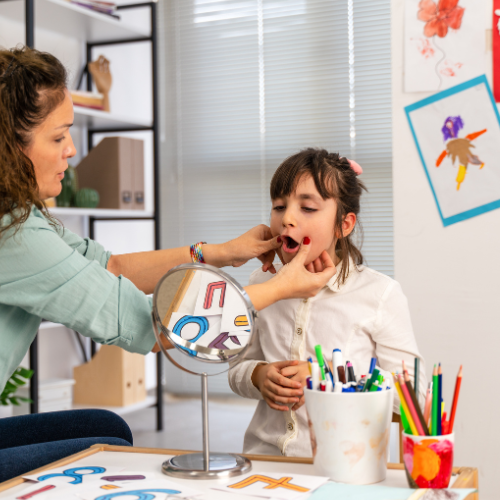
Understanding Articulation Disorders
Phonological (articulation) disorders include patterns of substitutions of sound in words. An example of this may include substituting /r/ for /w/ or “uh” sound (wed vs. red, watuh vs. water), substituting /l/ for /w/ lion vs wion, substituting /k/ and /g/ for /t/ and /d/, car vs. tar, go vs. do. Articulation disorders may also include a frontal lisp which is exhibited when there is tongue protrusion and a lateral lisp which demonstrates incorrect airflow and sounds like slushy speech. SLPs address difficulty with overall intelligibility or difficulty understanding your child speaking.
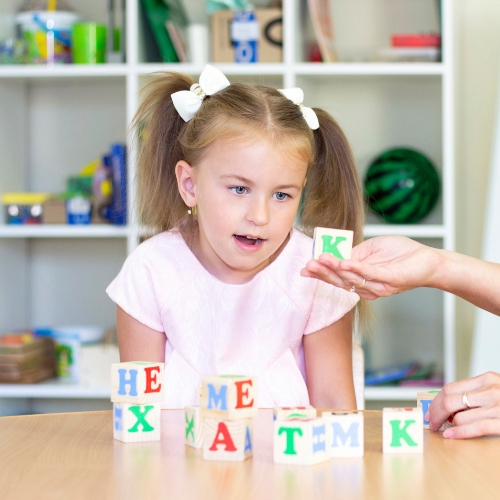
Explaining Childhood Apraxia of Speech
Childhood apraxia of speech is not a “developmental delay” of speech. A child with developmental delays with speech follows the typical path of speech development but does so more slowly than children typically acquires skills. Apraxia is a speech sound disorder. This disorder is classified as a motor speech disorder. Apraxia may be: difficulty with consistently speaking sounds/words with the exact same form, difficulty with or distortion of vowels, and/or underlying motoric speech difficulties.
unique therapy
What types of pediatric therapy services are provided by a licensed Speech-Language Pathologist (SLP)?

Understanding Language Development
Receptive language includes what a child comprehends (what’s coming IN to the brain). This may be demonstrated through pointing and identifying language concepts, following directions and/or commands, and comprehension of spoken or written language. Expressive language includes how a child communicates including verbalizing, signing, gesturing. babbling, jargon, using AAC (Augmentative and Alternative Communication) devices, or a mixture of these, aka total communication. Pragmatic language (social language) includes various types of play (functional play, symbolic play, solitary play, onlooker play, parallel play, pretend play), joint attention, greeting others, and engaging others in conversations appropriately.

Recognizing Stuttering vs. Normal Disfluencies
Normal disfluencies can occur when a child or even an adult is searching for the correct word or idea and instead of fluency speech there may be a pause, stopping, or an inserted “um”. However, stuttering includes repeating part of a word or whole words, prolonging sounds, excessive insertions of uh’s or um’s, and blocks (long pauses where the child wants to speak a word or words but is unable to.

Understanding Articulation Disorders
Phonological (articulation) disorders include patterns of substitutions of sound in words. An example of this may include substituting /r/ for /w/ or “uh” sound (wed vs. red, watuh vs. water), substituting /l/ for /w/ lion vs wion, substituting /k/ and /g/ for /t/ and /d/, car vs. tar, go vs. do. Articulation disorders may also include a frontal lisp which is exhibited when there is tongue protrusion and a lateral lisp which demonstrates incorrect airflow and sounds like slushy speech. SLPs address difficulty with overall intelligibility or difficulty understanding your child speaking.

Explaining Childhood Apraxia of Speech
Childhood apraxia of speech is not a “developmental delay” of speech. A child with developmental delays with speech follows the typical path of speech development but does so more slowly than children typically acquires skills. Apraxia is a speech sound disorder. This disorder is classified as a motor speech disorder. Apraxia may be: difficulty with consistently speaking sounds/words with the exact same form, difficulty with or distortion of vowels, and/or underlying motoric speech difficulties.
unique therapy
What types of pediatric therapy services are provided by a licensed Speech-Language Pathologist (SLP)?

Understanding Language Development
Receptive language includes what a child comprehends (what’s coming IN to the brain). This may be demonstrated through pointing and identifying language concepts, following directions and/or commands, and comprehension of spoken or written language. Expressive language includes how a child communicates including verbalizing, signing, gesturing. babbling, jargon, using AAC (Augmentative and Alternative Communication) devices, or a mixture of these, aka total communication. Pragmatic language (social language) includes various types of play (functional play, symbolic play, solitary play, onlooker play, parallel play, pretend play), joint attention, greeting others, and engaging others in conversations appropriately.

Recognizing Stuttering vs. Normal Disfluencies
Normal disfluencies can occur when a child or even an adult is searching for the correct word or idea and instead of fluency speech there may be a pause, stopping, or an inserted “um”. However, stuttering includes repeating part of a word or whole words, prolonging sounds, excessive insertions of uh’s or um’s, and blocks (long pauses where the child wants to speak a word or words but is unable to.

Understanding Articulation Disorders
Phonological (articulation) disorders include patterns of substitutions of sound in words. An example of this may include substituting /r/ for /w/ or “uh” sound (wed vs. red, watuh vs. water), substituting /l/ for /w/ lion vs wion, substituting /k/ and /g/ for /t/ and /d/, car vs. tar, go vs. do. Articulation disorders may also include a frontal lisp which is exhibited when there is tongue protrusion and a lateral lisp which demonstrates incorrect airflow and sounds like slushy speech. SLPs address difficulty with overall intelligibility or difficulty understanding your child speaking.

Explaining Childhood Apraxia of Speech
Childhood apraxia of speech is not a “developmental delay” of speech. A child with developmental delays with speech follows the typical path of speech development but does so more slowly than children typically acquires skills. Apraxia is a speech sound disorder. This disorder is classified as a motor speech disorder. Apraxia may be: difficulty with consistently speaking sounds/words with the exact same form, difficulty with or distortion of vowels, and/or underlying motoric speech difficulties.
Mighty Oaks Therapies
17774 Cypress Rosehill Rd Suite 320
Cypress, Texas 77429
Email: stacyc@mightyoakstherapies.com
Phone: 832-792-9399
Fax: 832-210-1894
Office Hours:
Monday: 1:00 p.m.–7:00 p.m.
Tuesday: 2:00 p.m.–7:00 p.m.
Wednesday: 11:00 a.m.–7:00 p.m.
Thursday: 11:30 a.m.–5:00 p.m.
Saturday: 9:00 a.m.–1:30 p.m.
Friday & Sunday: Closed
Contact Us Today
Fill out the form below. A member of our team will reach out to you as soon as possible for assistance.
Sign up to our newsletter
Thank you for contacting us.
We will get back to you as soon as possible
Uh oh, there was an error sending your message.
Please try again later
Mighty Oaks Therapies
17774 Cypress Rosehill Rd Suite 320
Cypress, Texas 77429
Email: stacyc@mightyoakstherapies.com
Phone: 832-792-9399
Fax: 832-210-1894
Office Hours:
Monday: 1:00 p.m.–7:00 p.m.
Tuesday: 12:00 p.m.–7:00 p.m.
Wednesday: 12:00 a.m.–7:00 p.m.
Thursday: 11:30 a.m.–5:30 p.m.
Saturday: 10:00 a.m.–12:00 p.m.
Friday & Sunday: Closed
Contact Us Today
Fill out the form below. A member of our team will reach out to you as soon as possible for assistance.
Sign up to our newsletter
RECEIVED ✓
Thank you for contacting us.
We will get back to you as soon as possible
Uh oh, there was an error sending your message.
Please try again later
